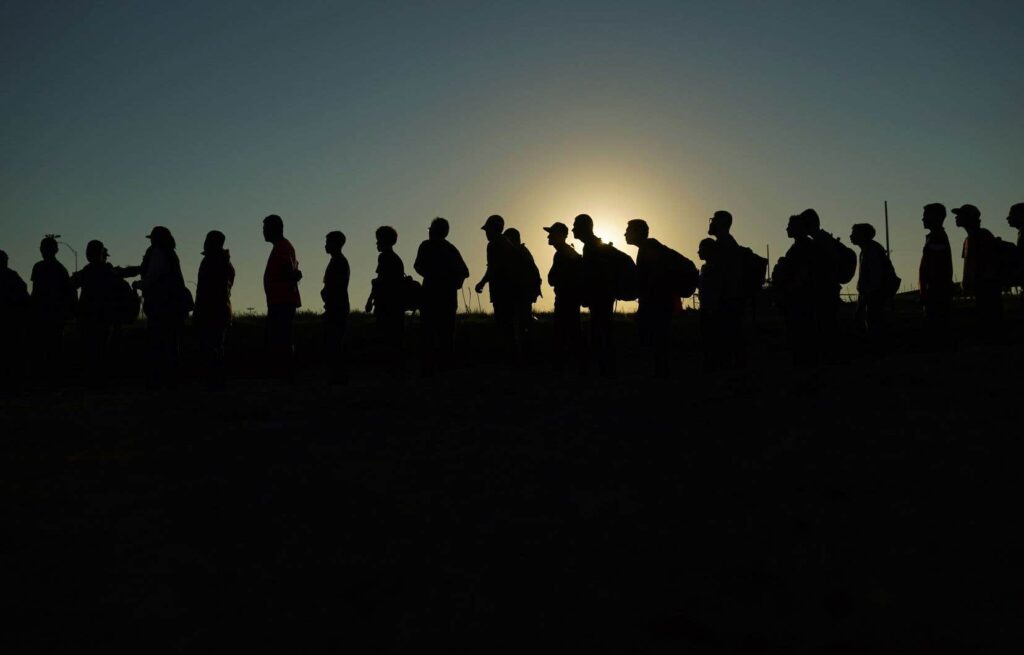Texas Gov. Greg Abbott opposes the Biden administration’s border policies on several fronts, which has helped catapult the topic of illegal immigration and record crossings at the U.S.-Mexico border into top of voters’ concerns ahead of the 2024 presidential election.
Several of Abbott’s initiatives have sparked court battles given that border policy, historically and under the U.S. Constitution, falls primarily within the jurisdiction of the federal government.
Here’s a look at major Texas initiatives and the status of legal challenges.
Operation Lone Star
Operation Lone Star (OLS) is Mr. Abbott’s multibillion-dollar border security initiative. It was praised by conservatives, who congratulate the Texas governor for his combative approach to security, but criticized by human rights defenders.
The initiative was launched in March 2021, when Mr Abbott declared a state of emergency over illegal immigration and cartel drug trafficking. He thus gained the authority to deploy thousands of National Guard troops and state police to the border.
Also from the “Washington Post”
But the program extended well beyond establishing a presence of Texas troops and police on the banks of the Rio Grande. Local and state law enforcement were empowered to detain migrants accused of trespassing. Funds were used to build a section of the border wall. The Texas Legislature supported the operation by increasing penalties for smuggling and allowing local police to take over immigration enforcement.
Civil rights groups have called on the U.S. Department of Justice to investigate the OLS after thousands of migrants were locked up in special corrections units and some were held for months without being charged. ‘an offense. Mr. Abbott frequently claims the operation is a success, highlighting the migrant arrests and drug seizures.
Bill 4 (arrest and expulsion of migrants)
Last year, Texas passed Senate Bill 4, known as “SB 4.” This law had the exceptional effect of making it a criminal offense for a person to enter Texas from Mexico without legal documents. It also authorized Texas to deport undocumented people. Republicans say the law is necessary because the Biden administration has been unable to stop the historic influx of migrants into this country.
But a trial judge suspended “SB 4” at the end of February, finding that it likely violated the constitutional requirement that the federal government, not the states, regulate immigration and borders. The Fifth Circuit Court of Appeal, known to be conservative, blocked the judge’s ruling and said the law could take effect during the litigation unless the Supreme Court intervened. The Supreme Court then temporarily reimposed its suspension, then, on March 12, extended this suspension until Monday, March 18.
Eagle Pass
The rural border town of Eagle Pass has become a symbol of the state’s draconian stance on border security, in defiance of the federal government. Since 2021, this has seen a significant increase in migration across a relatively shallow stretch of the Rio Grande.
In response, the governor took steps to discourage migrants. First, troops unrolled barbed wire and deployed buoys on the river. Then, in January, the Texas National Guard took over a city park, blocking border agents’ access to the riverfront. Authorities in other Republican states sent troops to help with patrols. It is also planned to create an operational base of more than 323,000 square meters.
Some residents are unhappy with the state’s control over this issue, but local elected officials have voted on several occasions for the gradual militarization of the Texas border.
Metal barriers in the Rio Grande
Last year, Mr. Abbott covered the banks of the Rio Grande near Eagle Pass with barbed wire to try to block illegal entries from Mexico. The federal government says the sharp barriers have injured and slashed migrants in several locations and pose a danger to U.S. Border Patrol agents while preventing its agents from reaching migrants who have already entered the country. American. Under US immigration law, anyone who sets foot on US soil has the right to seek asylum in this country.
Texas sued the Biden administration to prevent border agents from removing or cutting metal barriers, and a judge A district court ruled in favor of Texas, finding that the barriers limit illegal crossings, which impose costs on the state. But the lower court rejected the state’s request to block Border Patrol agents from accessing the international border or disrupting the fence while the litigation continues.
Texas appealed that decision to the Fifth Circuit Court of Appeals, which issued a temporary order prohibiting Border Patrol agents from cutting, damaging or moving the barriers. The Supreme Court, however, sided with the Biden administration, saying Border Patrol agents could remove the barriers if necessary until their legality was decided in court.
Sending migrants north
The Texas governor’s decision to bus thousands of migrants north to Democratic-led cities like New York, Washington and Chicago is perhaps his most nationally visible border initiative.
Since April 2022, Texas has transported more than 100,000 migrants to at least six cities, according to the governor’s office. Initially, migrant aid organizations welcomed this free transport. Most migrants released by the U.S. Border Patrol do not intend to stay in Texas border communities.
But this large number of migrants is putting a strain on cities like New York, traditionally proud to welcome immigrants from around the world. Many migrants are initially unable to work because they are waiting for their asylum applications to be processed. Residents in several cities have protested against allowing migrants to find shelter in their communities, while elected officials say the cost of caring for migrants is putting their budgets at risk.
This bus transport thus contributed to making the border crisis a major electoral issue while testing the generosity of “refuge cities”.

